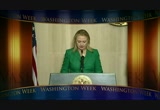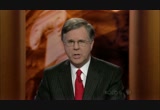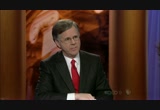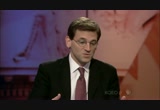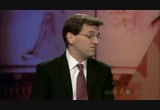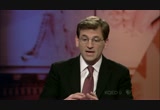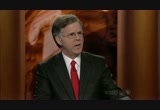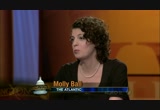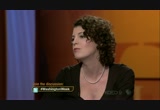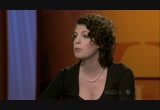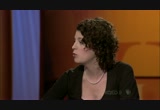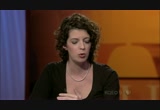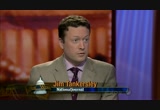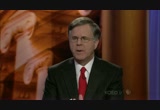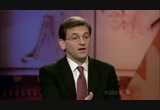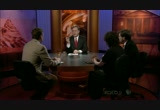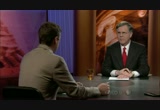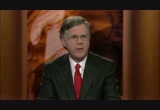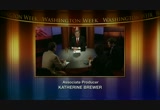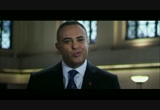tv Washington Week PBS November 24, 2012 2:00am-2:30am PST
2:00 am
the agreement today for a cease-fire in gaza. for it to hold, the rocket attacks must end. a broader calm return. pete: is the u.s. still the key to stopping the violence? at home, posturing and positioning over the fiscal cliff negotiations. >> would you subpoena a deal that does not include tax rate increases for the wealthy? is that something that's acceptable? >> no. pete: and a candid assessment of the stakes from one of the g.o.p.'s rising stars. >> the fiscal cliff is a creation of the political branch in washington, d.c. and an example of a dysfunctional process. that threatens our economy and millions of people across our economy. pete: is stalemate in washington stifling the economic recovery? joining us this thanksgiving week, peter baker of "the new york times." molly ball of "the atlantic." and jim tankersly of "national journal." >> award winning reporting and analysis. covering history as it happe.
2:01 am
from our nationas capital, this is "washington week with gwen ifill." produced in association with "national journal." corporate funding for "washington week" is provided by -- >> we know why we're here. to chart a greener path in the air and in our factories. to find cleaner, more efficient ways to power flight. >> and harness our technology for new energy solutions. >> around the globe the people of boeing are working together. to build a better tomorrow. >> that's why we're here. >> this rock has never stood still. since 1875, we've been there for our clients through good times and bad. when their needs changed, we were there to meet them. through the years, from insurance to investment management, from real estate to retirement solutions, we've
2:02 am
developed new ideas for the financial challenges ahead. this rock has never stood still. and that's one thing that will never change. prudential. >> additional corporate funding is provided by norfolk southern. additional funding is provided by the annenberg foundation, the corporation for public broadcasting and by contributions to your pbs station from viewers like you. thank you. once again, from washington, sitting in for gwen ifill this week, pete williams of nbc news. pete: good evening. we hope your holiday went well. president obama and hillary clinton could not have expected their week to unfold as it did. the president was hoping to focus new attention on the promise of u.s. relations with the far east. secretary clinton was with him on what she thought would be her last overseas mission. instead, mr. obama found himself
2:03 am
on the phone with middle east leaders as israel and hamas in gaza rained down rockets on each other. and secretary clinton headed for the region hoping to use a cease-fire to search for longer term answers. >> now we have to focus on reaching a durable outcome that promotes regional stability and advances the security, dignity, and legitimate aspirations of palestinians and israelis alike. pete: but she also made it clear the u.s. is firmly supporting its ally israel. peter baker was traveling with the president. peter, with all the changes in the region, how has the u.s. role changed in this process? >> well, of course, you saw president obama taking a very hands on role in this. something that he's been reluctant to do at times in the past. he had a bad experience trying to involve himself in peace making in the middle east in the beginning of his presidency. he grew a little disenchanted with how intransigent players were.
2:04 am
he and netanyahu the prime minister of israel have a troublesome relationship to say the least. and yet he decided in this case he had to dir ctly dive in and making phone call after phone call. he's in and out of these asian summit meetings and grabbing the known to talk to netanyahu, talk to president morsi of egypt. and he recognizes something that almost every president eventually discovers which is that america is still indispensable player when it comes to these sort of conflicts in the middle east. pete: still the indispensable player and hasn't changed with the arab spring? >> the arab spring hasn't changed that and you've seen the revolution of the arab spring and our relationship to it particularly in this relationship, this new partnership between president obama and president morsi of egypt. very interesting history. president morsi from the muslim brotherhood just a few weeks back before the election, the americans and the obama administration very upset at morsi for not doing more to protect the embassy in cairo during some of those protests there. this week, you saw this sort of new partnership developing and they were on the phone
2:05 am
repeatedly. 11:30 at night. 2:30 in the morning from air force one. morsi was a key as far as he could see to solving this problem. he was investing a lot of his own capital with president obama was in this new partner in egypt. pete: speaking of key players, can you tell us about secretary clinton's role in all this and how that's played out? >> they were on their last buddy-buddy trip, president obama and secretary clinton and in bangkok together and visiting the reclining buddha. they were making jokes about the 2016. and joe biden's head was exploding back here. and suddenly she's on a plane zipping out of phnom penh to say we're on our way and directly involve ourselves in this. she has not played this shuttle diplomacy role in the middle east quite the way that some of her predecessors had, right? obviously kissinger and jim baker and condi rice to various stents have been these -- back and forth missions. this is her first one in her own twilight days as secretary of state. she's getting ready to step down
2:06 am
come inauguration in january. >> and what do you think the relationship between obama and morsi tells us about the future for the region? >> well, they see this as a possible key to beginning to unlock some of this. if morsi through his relationship to hamas is able to begin to bring them to the table in effect, that offers a lot of potential. but -- the obama administration is very cognizant of the fact that it wouldn't be easy. the president came under a lot of attacks during the campaign for not having visited israel during his first term in soffs. they had planned to find a way to try to get there. sometime early. in the second. that's put on the shelf. it's too early given what's just happened in gaza to think about sending a president unless he has something good to announce. that may be off a little more in the future. pete: tell us a little bit about the calculations for morsi. as i understand it, the people on the street in egypt are not necessarily urging him to look for peace. they sort of like the idea of turning up the heat on israel. so what's the line he's walking?
2:07 am
>> it is a difficult and dangerous line for him. you're right. the people that traditionally have been his base of support are very much on the side of the palestinians in this case. very much outraged at what they saw as israel's heavy handed response. to the rocket attacks. and yet he chose to put that aside. which is one thing that president obama i think likes about him. president obama sees in president morsi a man who has been an engineer, precise, no guff, no nonsense and not as ideological as a lot of people would have thought a muslim brotherhood president would be. pete: and a new relationship between president obama and prime minister netanyahu? >> well, that's really good question, isn't it? their relationship is complicated on multiple levels. there's this continuing conflict with hamas and continuing tension with iran. just over the horizon. what is it going to be the next step in getting tehran to back off on its nuclear ambitions? we saw very -- fought back and
2:08 am
forth during the campaign about that. i don't think that president obama or prime minister netanyahu necessarily have a better relationship today than they did a month ago. but president obama was very clear in every public statement saying israel is right to defend itself. it has every right. he refused to tell them not to go in on the ground. president obama is doing nothing to let any air exist between the two of them. at least in a public sense. pete: why not say that it's a better relationship now? i noticed it was interesting that netanyahu sort of went out of his way to say he agreed to the cease-fire after consulting with president obama. >> right. president obama did urge him to take the cease-fire and there was a collaboration in that sense. i just think that there's -- you know, a lot of history of distrust there. to overcome. and it may be that this -- this happens. in the next year or two. but i think really what the obama administration is waiting for is the next israeli election to see what that brings. pete: all right. peter, thank you very much. anyone driving from new york to new jersey on the george washington bridge sees the steep cliffs of the palisades from
2:09 am
which damsels in distress once dangled at the end of silent movie episodes filmed there. literally cliffhangers. anyone driving from the white house to capitol hill on pennsylvania avenue can't see the fiscal cliff. but it could be much more perilous. over the past week, we've heard some optimism for a happy ending but also some tough talk about no compromises. so molly, does it look like the economy could be rescued before the second reel of this movie starts in january? >> i think there's reason for optimism and reason for pessimism. and the reason for pessimism is basically that it's congress. and you know -- and we know what the track record is there. and there are so many incentives toward gridlock. but the reason for optimism is that we at least in these sort of preliminary -- the parties sort of sniffing each other out, there has been a lot of happy noises coming off of capitol hill. now, i think that masks the fact that the two sides are still quite far apart on the substantive issues that are on the table. but they are at the table. and they realize i think that the american people really want
2:10 am
them to be at the table in good faith. trying to solve this problem. now, i'm a little wary of saying this because it's a bit of a democratic talking point. but it's also true that we're not talking about instant fiscal calamity on january 1. certainly there would be reaction in the markets. and certainly going off the cliff isn't a good idea. we had bernanke saying that a couple of days ago. but it's probably not the case that things would immediately explode. pete: so lay out for us how it could go. what are the three ways you think it could actually break? >> there's basically three options here. number one is we go off the cliff. nothing gets done. either deliberately or accidentally because there's -- because it's an impasse. and then we see what the economic consequences are. and there may be a scramble to put together a deal after the fact. number two is that there is some -- that -- a grand bargain is reached. the big deal and everybody claims to want, that they're actually able to get their act
2:11 am
together between now and christmas and accomplish that. and number three is the sort of middle way that they find some kind of interim arrangement. they kick the can down the road which is a great track record in congress for that kind of action. they put together some kind of band-aid that buys them more time with the hope of or perhaps making a framework to put something bigger together. pete: what form would a band-aid take in rough terms? >> well, it probably would be a stop gap that takes care of a couple of months. that preserves more or less the status quo. that forestalls a lot of the spending cuts that the deadline is coming up for. and also probably forestalls a lot of the tax hikes that the deadline is coming up for. >> a lot of us are going to be recovering from gorging this last couple of days. we had our turkey and we've had our mashed potatoes. we don't want to do the workout. what do voters want? are they prepared to do the hard working out to pay off the calories we've just consumed? what is the electorate telling
2:12 am
these leaders here in washington? >> right. obviously nobody -- noshe wants to -- nobody wants to sacrifice. you have a lot of interest groups claiming that the political will is on their side. when you dig into the polling, people do want compromise. they -- despite the noises on both sides of what we're willing to walk away from the table, people do want a compromise. and they're sick of the gridlock. they do want tax hikes on the wealthy. this was asked in the presidential exit poll. this has been asked in a variety of polls for a while. and people do want to see those bush tax cuts expire on incomes over $250,000 which is a major democratic stance in these negotiations. they do not want to see entitlement cuts which is something that republicans appear to be demanding. and which certain centrists are saying has to schaap. that people don't want to see social security benefits, medicare benefits cut. they're willing to see cuts to
2:13 am
defense. and that's also part of the sequester agreement. but they don't like cuts to other parts of the federal budget. >> how are the politics of this shaping up? we're looking at this from a strategic perspective, who harris the upper hand and who's playing from behind? >> the democrats feel they have the upper hand and you've seen to what extent it's posturing or not, you see a lot of sort of swagger coming out of obama in his press conference last week. and democratic leaders saying we're willing to go off the cliff. we are not going to compromise on the tax hikes. they're talking much less about the spending cuts that and also they say would be part of a so-called balanced deal. but i think on some level, republicans realize that they don't have a lot of leverage in this situation. certainly people want to see both taxes and spending. but the republicans that i talked to are a little bit nervous. and you see them also coming out with some tough talk.
2:14 am
speaker boehner saying that he even wants to bring health care back into things. but i think republicans realize -- and you see the conciliatory way they're talking about taxes, right? they're saying even though we don't want these tax hikes we're willing to bring in more tax revenue. pete: speaker boehner's reference to the obamacare was in an op-ed he wrote in "the cincinnati enquirer" this week. what is that all about? is that a way of showing the voters how tough they still are and making it easier than to compromise? >> that seems to be what it is. it seems to be a little bit of a tactic and maybe a sop to the base. a lot of conservative republicans are worried about what they see as republicans going squishy. because you have republicans saying that they are willing to abandon the grover norquist no ta pledge. you have republicans making very conciliatory noises about immigration reform. and so the base is concerned that the party is basically just going to go along with democrats on everything. so that may have been a way to reassure conservatives that he hasn't abandoned them. pete: all right, molly.
2:15 am
everything here seems to be continued but this is certainly one of them. while avoiding the fiscal cliff will prevent the economy from sliding down into recession, it won't put 12 million people back to work. and jim has written in "national journal" that president obama has to contend with four other forces if he wants to get the economy on better footing. what are those forces? >> these are the forces that have been holding back the recovery in big tore little ways over the last few years. ever since the recession ended. the good news is that a couple of them are starting to abate. let's start with the one that's getting hert. the housing market absolutely was the main driver for why this recovery has been so slow. and it's really starting to turn up. home values are going up. we're seeing home builder sentiment go up. those are good things. the two sort of wild from abroad have been europe and china. europe is basically back in recession. china has come -- has lowered its growth from the last couple of years and so it's a soft landing it appears over there. and then the fourth thing has
2:16 am
been volatile gas prices. high and volatile gas prices. and this has been a plague in consumer spending because if you're paying more to fill up your tank you'll have trouble buying things on black friday and consumer engines of the recovery that we need. so for the recovery really to pick up and gain steam, we need brakes in all four of those to get there. pete: one thing in your article, there's always a concern that the contagion in european banks would spread to the united states. we've been hearing this warning or this concern for a year and a half. why hasn't it? >> there's a couple of reasons. american banks have taken some steps to really improve their capital positions. make themselves healthier basically and -- pete: by not loaning money to anybody. >> that's been an unfortunate byproduct. and there's a lot of reasons for that. but part of what's going on here is they are building up buffers. and the other part is the european banks themselves have not spread a lot of contagion so far around the world. we see growth drags from europe
2:17 am
not buying as much of our stuff or china's stuff but we haven't seen a massive spreading financial crisis emanating from european banks. >> it's interesting. you mentioned the world economy. president obama was in asia. for this trip, this weekend. and asian leaders, at the summit in phnom penh and they talk about the economy. and the two x factors they mentioned are european as you mentioned and the united states. to them, we're the x-factor. particularly on the fiscal cliff and everybody brought that up with the president and what's going on and he even got asked by a buddhist monk at a monastery in bangkok. how much is the rest of the world dependent on or worried about what we're doing here in terms of our fiscal cliff? >> you wouldn't know it from the rhetoric over the last campaign we went through. but america's economy right now is one of the most important driving engines of the global recovery. as halting as it's been and as slow growth has been compared to what we need it to be to be at full employment america is chugging along compared to europe. the world needs that.
2:18 am
so it's impossible to understate how important getting past the fiscal cliff in a constructive way would be to helping the global economy recover. for a lot of reasons, but the biggest of which is we all live in an interdependent economy now. if we slow down our fall back into recession that hurts china which sells us a lot of stuff and hurts europe and we're propping them up in some ways with our growth. so this is a huge deal not just for us but for the entire world that we get this right on the fiscal cliff. >> assuming knock on wood that we do get past it is there any meaningful economic policy that can or should come next in washington? >> a couple of things that could be done. and if we get past it with what you laid out there, was choice two, the grand bargain, and we showed that democrats and republicans can actually work together to solve problems, you'll probably see a market reaction in a positive way. that could lead to more growth. and they could build on that. with some other compromises. one of the biggest would be a reinvention of government. meaningful tax reform to make
2:19 am
the code less complex, to more efficient in terms of how investment gets directed in the economy. and then things that really help medium and long-term job growth. like overhauling job training programs. both democrats and republicans want to do it. figure out a better way to take the people who he been displaced by the slowdown in manufacturing or by globalization in general and get them into better jobs. that would be something that i think the parties could come together on and really help the economy. pete: let me ask you a question and weigh in on this as well. so you mentioned these four factors. and there was lots of talk in the campaign about what the candidates could do to help the economy. but what can the president or what can congress or perish the thought the president and congress working together do to make any difference for those four areas? >> well, there's a few things. the president is trying on -- to accelerate the housing recovery even further by using the leverage that we have with the government basically underwriting most of the home lending market right now. he's been thwarted by his own agencies. but he mass a chance to appoint
2:20 am
a new head of one of them. pete: which is -- >> the fhfa. and that would be a guy named ed demarco who would be out and put someone in who would be more sympathetic to obama's housing policies. with europe, i think the best thing that the president could do is put some pressure on the international monetary fund to write down or write off or suspend interest charges on greek borrowing. if we can help greece solve its problems, we can start a domino effect of positive things in europe. pete: do you agree that there's a lot the president can do to improve the economy? >> i think there are some things and jim knows much better than i do. there's also a feeling in the white house that they have put the building blocks in place and can they get past this fiscal cliff moment? we're on a track to a better four years anyway. when you heard during the campaign mitt romney promise 12 million new jobs, you heard obama say we're going to have 12 million new jobs anyway these next four years, just based on where we are right now. without even additional stimulus
2:21 am
or additional x factors that would goose the economy. pete: we always talk about new cabinet secretaries. would it change -- a change at the treasury department make much difference? >> everybody expects tim geithner to step down and he's been there four years and pretty exhausting. the leading candidate seems to be jack lou, white house chief of staff. and good relationship with the president right now. good relationship mostly on the hill. and so he would have credibility there. but i don't know how much the personnel matters. pete: molly, can congress make much of a difference here in improving the economy other than fix being the fiscal cliff problem? >> i mean, part of what jim seems to be saying is that the economy is on not exactly a glide path but sort of already stumbling its way toward what needs to happen. and i always felt covering the campaign that that was sort of the dirty secret of both candidates' rhetoric was that neither of them really had a concrete achievable or constructive policy plan to move forward. it was really just sort of sit on your hands and hope things get better. pete: all right. thank you all very much. thank you. that will have to wrap it up for
2:22 am
tonight. where leaving a bit early because it's pledge week. we like to think of it as giving you a chance to support your local pbs station. which in turn supports us. so be sure to check out our webcast extra. where we talk more about hillary clinton's last overseas trip. alongside president obama and what her future might look like. that's at pbs.org/washingtonweek. i'm pete williams. gwen ifill will be back around the table next week. on "washington week." good night. >> funding for "washington week" is provided by --
2:23 am
>> wherever our trains go, the economy comes to life. norfolk southern. one line. infinite possibilities. >> corporate funding is also provided by boeing. prudential financial. additional funding is provided by the annenberg foundation, the corporation for public broadcasting and by contributions to pbs stations from viewers like you. thank you. >> be more.
273 Views
IN COLLECTIONS
KQED (PBS) Television Archive
Television Archive  Television Archive News Search Service
Television Archive News Search Service 
Uploaded by TV Archive on

 Live Music Archive
Live Music Archive Librivox Free Audio
Librivox Free Audio Metropolitan Museum
Metropolitan Museum Cleveland Museum of Art
Cleveland Museum of Art Internet Arcade
Internet Arcade Console Living Room
Console Living Room Books to Borrow
Books to Borrow Open Library
Open Library TV News
TV News Understanding 9/11
Understanding 9/11